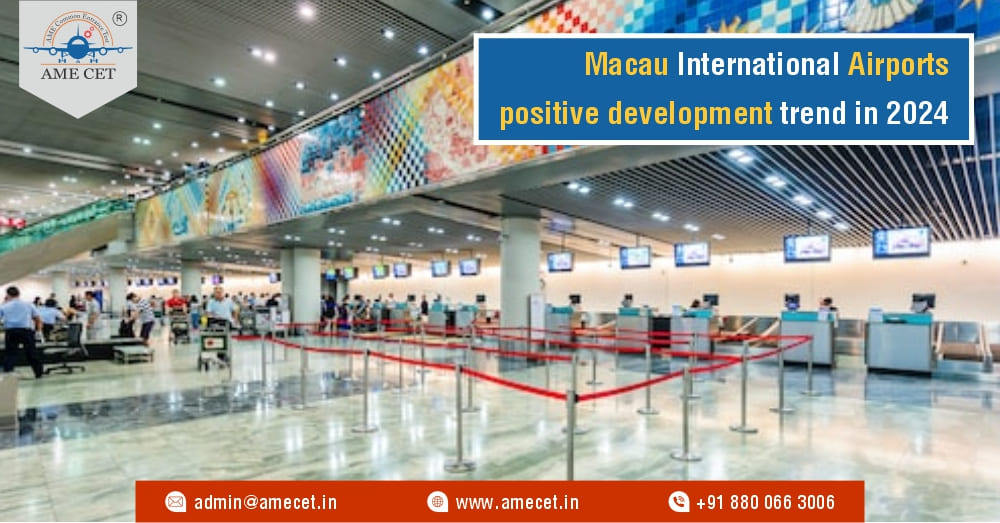
Macau International Airport (MIA) is witnessing a strong resurgence in 2024, with a positive development trend expected to continue throughout the year. After the challenges faced by the aviation industry in the past few years, the airport is rebounding swiftly, aided by increased air traffic, new airline partnerships, expanded infrastructure, and a growing number of job opportunities. These developments not only mark a recovery but signal long-term growth and a brighter future for the region’s transportation and tourism sectors.
Airlines Boost Traffic and Connectivity
A key driver of the positive growth at Macau International Airport has been the expansion of airline services and the resumption of flights to and from various international destinations. As global travel recovers post-pandemic, airlines are ramping up their operations at MIA, with both regional carriers and international giants increasing their frequency of flights. The airport has seen a marked rise in both passenger numbers and cargo traffic, as airlines look to capitalize on the growing demand for travel.
Several major airlines have announced new routes or expanded existing services to Macau, enhancing the airport’s connectivity within Asia and beyond. Notably, the resurgence of key routes to Mainland China, Taiwan, and Southeast Asia is being complemented by the return of long-haul services to Europe and Australia. With the expected growth in both passenger and freight traffic, MIA is positioning itself as a vital hub in the region.
The increased number of airlines operating from the airport has also fostered healthy competition, pushing for better service quality and more competitive pricing, which benefits travelers and enhances the region's appeal as a destination for both business and leisure travel.
Airport Infrastructure Development
In response to the growing demand, Macau International Airport has been heavily investing in its infrastructure. The airport management has announced plans for an ambitious expansion project, which includes modernizing the terminal, upgrading the runway systems, and enhancing baggage handling capabilities. These developments are expected to improve operational efficiency, reduce congestion, and provide an overall more comfortable experience for travelers.
Additionally, the airport is investing in the latest technology for passenger services, including self-check-in kiosks, biometric screening, and automated baggage handling systems. These initiatives are designed to improve the speed and efficiency of airport processes, which in turn will increase the airport’s capacity to handle more flights and passengers.
The expansion of MIA also includes the growth of the retail and dining facilities, which is expected to further enhance the passenger experience. The introduction of new shops and restaurants will not only provide travelers with more options but also generate additional revenue for the airport and contribute to the local economy.
Job Creation and Economic Impact
The positive development trend at Macau International Airport is not just an economic boon for the aviation industry but also a major contributor to job creation in the region. The expansion of both airline services and infrastructure development is creating new employment opportunities across various sectors, from aviation management to retail and hospitality.
Airport operations alone have seen an increase in the hiring of ground staff, security personnel, and customer service teams. Additionally, new businesses and services are opening up within the airport's commercial spaces, creating jobs in retail, food and beverage, and logistics.
The construction and infrastructure projects associated with the airport’s expansion are also contributing to local employment. The development of new terminals and facilities requires a skilled workforce, providing opportunities in construction, engineering, and project management. The influx of jobs, combined with the growing number of visitors to Macau, is expected to have a positive multiplier effect on the broader economy, benefiting other sectors such as hospitality, tourism, and transportation.
Management Focus on Sustainability and Innovation
In line with global trends towards sustainability, MIA's management has prioritized eco-friendly practices and technological innovation in its development plans. The airport has implemented energy-efficient systems in its terminal buildings, introduced waste-reduction initiatives, and adopted sustainable aviation fuel (SAF) options for airlines operating from the airport.
In terms of management, MIA is also embracing digital transformation by integrating advanced technologies in its operations. These include enhanced passenger flow management systems, predictive analytics for flight scheduling, and automated customer service solutions. By adopting these cutting-edge solutions, the airport is not only improving operational efficiency but also positioning itself as a forward-thinking, innovative player in the global aviation market.
Outlook for the Future
The growth and positive development at Macau International Airport in 2024 are just the beginning. With the continued recovery of the global travel industry, the airport is expected to see more airlines joining its network, further expansion of its infrastructure, and increased job opportunities across various sectors. MIA is on track to become a key gateway to Asia and a crucial player in the region’s aviation and tourism industries.
As Macau’s economy diversifies, the airport’s growth will play an important role in supporting the city’s ambitions of becoming a leading international travel hub. The future looks bright for Macau International Airport, with strong prospects for growth, innovation, and sustainability.
Category
-
Aircraft Maintenance Engineering (DGCA) (62)
-
(268)
-
Cabin Crew (1)
-
Aerospace Engineering (3)
-
Aeronautical Engineering (2)
-
Airport Management (5)
-
Aircraft Maintenance Engineering (EASA) (6)
-
Airport Ground Staff (1)
-
Commercial Pilot License(CPL) (51)
-
Aircraft Maintenance Engineering (BTech/BE) (1)
-
B.Sc. in Aviation (1)
-
AME CET (5)
